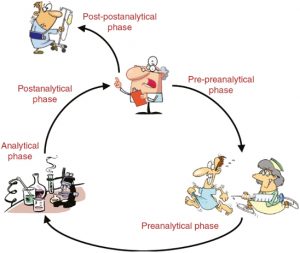
The preanalytical phase is a very important component of laboratory medicine. This phase includes all those steps that occur in the practice such as specimen collection, handling, storage and shipping to the laboratory. The pre-analytical phase also includes physiological variables specific to the animal, such as age, gender, pregnancy, and endogenous variables such as medication the animal may be taking or recent meals when the patient is not fasted. Some of these preanalytical variables such as specimen variables can be controlled bur a thorough knowledge of uncontrollable variables is necessary in order to be able to separate their effects from disease related changes affecting laboratory results. Interestingly, preanalytical errors range from 50% to 75% of the total errors registered in diagnostic laboratories. For this reason, in the last decade there has been an intense focus on the preanalytical phase leading to the development of recommendations and standards. A few basic recommendations specifically related to haematology and biochemistry samples are listed below:
- Sample collection: Venipuncture should be performed in the most atraumatic way as possible since a good sample collection technique is vital to obtain a blood sample of adequate quality for analysis. In fact, traumatic venepuncture may cause several sample artefacts from spurious haemolysis to formation of macro/microclots.
- Choice of anticoagulant and tube: EDTA whole blood is the specimen of choice for most haematology variables, whereas serum is recommended for routine biochemistry. When multiple blood tubes are collected from the same patient, carryover of anticoagulants or other additives should be avoided. The recommendations are to start with the citrate tube for coagulation, followed by plain serum tube, followed by heparin, EDTA tube and fluoride/oxalate tube. This will avoid serum contamination by EDTA which can cause false elevations of potassium and false decrease of calcium. Serum gel separator tubes can be used for most biochemical analysis but should be avoided for hormones and drugs measurements.
- Sample storage: Haematology samples should be processed and examined as soon as possible, ideally within a few hours for collection. If the sample is sent to an external laboratory, refrigeration is recommended. For biochemistry testing, serum should be separated and transferred into a plain tube and kept at refrigeration temperature until the analysis is performed. For longer storage, freezing is recommended.
At BattLab, we take the preanalytical phase of the laboratory process very seriously. We are always in contact with our clients to assure that the quality of the samples we receive is adequate. We also supervise the analytical process very carefully, using state of the art analysers and having in place a daily internal quality control system and an external quality programme for most measured analytes. For more information about these topics, do not hesitate to contact us.
